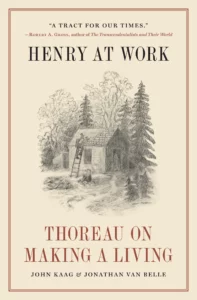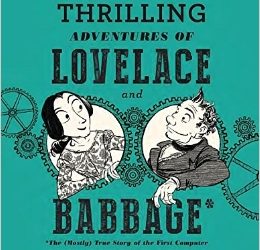NOTE: We’re mid-way through summer and still people are looking for good books to take on vacation. Academics are still hopeful that they’ll catch up on some serious reading in their field and students are procrastinating over any assigned reading. Whether or not you fall into any of those categories, today’s Scholarly Kitchen post is part of a short series of book reviews of humanities titles emerging from independent and university presses. Each one represents a great read.
Does Henry David Thoreau still appear on summer reading lists or has he been dropped in favor of other perspectives? Walden, A Week on the Concord and Merrimack Rivers, The Maine Woods, and Cape Cod were the output of a gifted observer and naturalist. None of his books sold well during his lifetime, despite the influence and support of Ralph Waldo Emerson and other Transcendentalists. In the twentieth century, his popularity was revived by a burgeoning environmental protection movement as Thoreau’s focus was on how an individual human being might recognize, appreciate and fit in with the beauty of a larger ecosystem. The man strove to live unencumbered and attached no particular value to the role played by the business community of his day. One memorable bit from Thoreau’s journal in 1856 reads “Our employment generally is tinkering, mending the old worn-out teapot of society”, a sentiment not far removed from his well-known comment on men leading lives of quiet desperation.
 Over the course of the past 12-18 months, mainstream media has been reporting a tension between employers and paid workers over appropriate attitudes. Employers insists there must be in-office time spent with colleagues to ensure productivity and robust teams. The response from workers has run a spectrum between the Great Resistance and what the Huffington Post christened the Great Regret. The BBC suggests that flexible remote-work arrangements are a key job benefit to the workforce. Most recently in June, a new book from Princeton University Press refocused attention on Thoreau’s consideration of earning one’s livelihood and what makes the effort worthwhile.
Over the course of the past 12-18 months, mainstream media has been reporting a tension between employers and paid workers over appropriate attitudes. Employers insists there must be in-office time spent with colleagues to ensure productivity and robust teams. The response from workers has run a spectrum between the Great Resistance and what the Huffington Post christened the Great Regret. The BBC suggests that flexible remote-work arrangements are a key job benefit to the workforce. Most recently in June, a new book from Princeton University Press refocused attention on Thoreau’s consideration of earning one’s livelihood and what makes the effort worthwhile.
Henry at Work: Thoreau on Making A Living by John Kaag and Jonathan van Belle suggests that the current workforce might more happily navigate a changing 21st century workplace by paying attention to the core of Thoreau’s thinking. His value to the modern reader is his view that a person should identify their own work as being that which draws on their individual personal strengths in making a contribution. It is that sense of contribution that uplifts one’s daily grind from “mending society’s worn-out” teapot to something more worthwhile.
The book’s chapter headings reflect that transition, beginning with that ultimate mechanical action of “Clocking In”, a consideration of manual and machine labor, meaningless work and immoral work, until one recognizes and commits to the self-determination of “Fulfilling Work”. As the authors put it on page 158 in their closing, “Thoreau, a student of Emersonian self-reliance, suggested that each of us has a very limited time on this earth to labor and that we must do our very best to exert ourselves, to express ourselves, in the passing of the days.”
Authors Kaag and van Belle seek to reconcile and balance the idea of meaningful work with the need to be gainfully employed in a team or corporate environment with its own cultural frictions. On that same page 158 is included this modern note: “The demand to own the tasks of your life and to be the author of your working life is not the license to be a selfish jerk at the office, but rather the imperative to become responsible for your vocation.” Where can you make the greatest contribution?
The June publication date of this book suggested to me that Princeton University Press saw the audience as being recent college graduates, early-career (or even under-employed) workers wrestling with decisions over how to move forward. With student loans to be repaid, they enter an uncertain economy worried over the impact of artificial intelligence. Automated job application processes are increasingly dehumanizing. Social inequities create further tensions, the authors recognizing in an early chapter that “Manual work that is not freely chosen is much more difficult to experience as meaningful, much less as transcendent.” So where does this leave those who’ve taken the time to read Henry At Work?
For me, any thought of Thoreau and Walden Pond inevitably brings up thoughts of Doonesbury and how the work of cartoonist Gary Trudeau has contributed to understanding conflicts arising from the ideal of life on Walden Pond and the lived American experience. Sharing a living space in the comic strip were befuddled student Mike Doonesbury, football athlete BD, and counterculture hippie, Zonker Harris. None of them knew how to navigate their world-in-transition either as they emerged from college life. Trudeau’s output was deeply satirical, funny and infuriating, addressing the emerging experiences of working women, wounded vets home from foreign wars, and inane political figures. At the same time, the humor could gently restore one’s faith in life.
The same restorative faith emerges from Henry At Work. All too frequently, the modern workplace is confusing, absurd, even hide-bound. One should at least consider the return on investment of personal time and energy. If nothing else, reading Henry at Work may cause you to retrieve that old paperback copy of Walden to refresh your thinking about paid employment as you sit under a shade tree.
Discussion
1 Thought on "Thoreau and the Office Cubicle"
Thanks you Jill for your review and for brining this book to my awareness. I will look forward to reading it. I wonder if the book touches on the extent to which Thoreau’s thinking about work and vocation was informed by his interest in (and active work in) the family business, which was making pencils (https://www.uh.edu/admin/engines/epi339.htm). Thoreau has become an iconic naturalist and cultural touchstone (and rightly so) but was also writing amidst industrialization — in that sense he was writing during a world-in-transition moment too. He remarks several times in Walden on the new railroad that went through Concord but leaves curiously absent (in that book and others) mention of the family’s pencil factory. Thoreau carved out the time for his writing and travels (and we are grateful for it) but was never dependent on writing for making a living.


